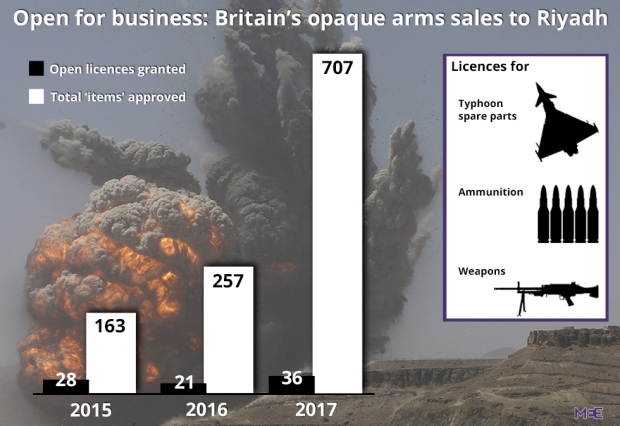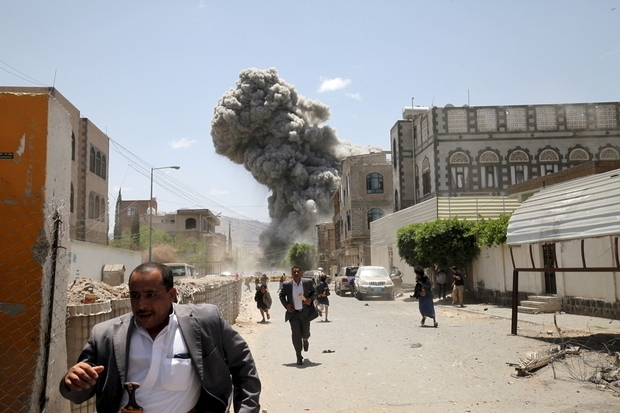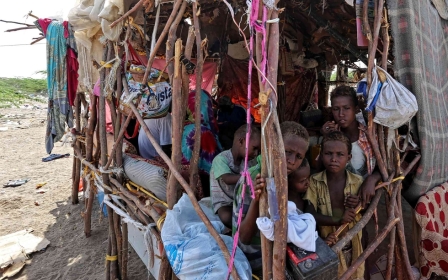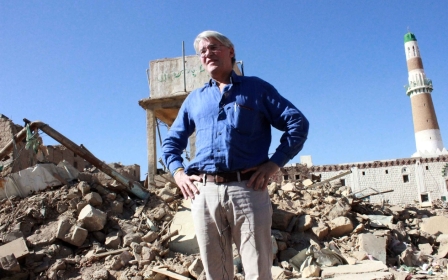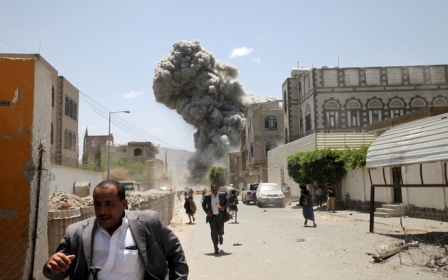EXCLUSIVE: Huge rise in Britain's secretive arms sales to Saudi Arabia
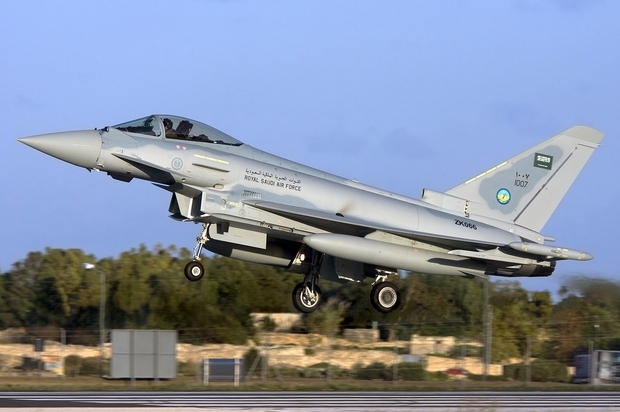
LONDON - The UK has been accused of concealing the true extent of its support for Saudi Arabia’s bombing campaign in Yemen by overseeing a vast rise in the use of secretive arms exports licenses, Middle East Eye can reveal
The dramatic new figures on the opaque open licence system, which keeps the value of arms and their exact nature out of the public domain, come as Mohammed bin Salman, the Saudi crown prince and chief architect of the war in Yemen, is due to visit London on Wednesday to meet Prime Minister Theresa May.
The government is trying to hide its role in fuelling the Yemen war
- Emily Thornberry, Labour shadow foreign secretary
The UK has used standard arms licences to approve more than $6.4bn in arms to Saudi Arabia since the start of the war in Yemen in 2015, including advanced jets and munitions.
But figures seen exclusively by Middle East Eye show that the government has actively overseen a more than 75 per cent increase in the use of secretive "open licences" to approve additional arms sales to the kingdom, including vital parts for the jets striking targets in Yemen.
The rules for open licences was updated by government in 2015. They are difficult to track and allow for multiple consignments of arms to be sent to the same destination without public scrutiny or parliamentary oversight.
The government has repeatedly defended arms export to Saudi Arabia, a key regional and security ally, but Emily Thornberry, Labour’s shadow foreign secretary, has accused Theresa May’s government of trying "to hide its role in fuelling" the war in Yemen.
She told MEE: "Instead of seizing their responsibility to help stop this dreadful war, the government is just trying to hide its role in fuelling it."
The world's forgotten humanitarian crisis
The conflict in Yemen killed more than 10,000 people - many of whom were civilians who died in Saudi-led coalition air strikes. Millions more civilians face starvation and disease in a humanitarian crisis aid agencies say has largely been ignored by world powers.
The conflict has reached an effective stalemate. It includes a blockade that the UN says has left more than eight million civilians facing a famine.
Last month MEE revealed that the Saudi-led coalition is investigating less than 15 percent of more than 300 alleged violations of international law carried out by its forces in the country.
Anti-arms trade campaigners say the opaque open licences, which include spare parts for strike aircraft as well as missiles, play a deadly role in the conflict as they are key to keeping the Saudi air force in the air above Yemen.
"Without the arms sales, spare parts and assistance from the UK and the US, the air war over Yemen would stop within 48 hours," said one former military source.
The data, compiled by Campaign Against Arms Trade (CAAT), shows that last year 36 licences were granted for 707 items of military or dual-use hardware for export to Saudi Arabia, up from 28 licences and 163 pieces of military kit in 2015.
In total, the government has approved 85 seperate open licences and more than 1,127 items of military or dual-use equipment under the system since the start of the Yemen conflict. These include licences for aircraft and helicopter components, vital for continuing the Saudi-led bombardment of Yemen, as well as missiles, machine guns and sniper rifles.
'A disgraceful increase in arms exports'
However, the opaque nature of the open licence regime, known in Whitehall jargon as Open Individual Export Licences, or OIELs, means the actual volume of exports approved under the secretive system could be far higher, say campaigners.
Thornberry, who has called on ministers to raise the Yemen war with bin Salman when he visits London on Wednesday, added: "This disgraceful increase in the number of open export licences dates precisely from the start of the Yemen war, and means we cannot accurately assess either what weapons are being sold to Saudi Arabia, or their total value."
Thornberry went on to promise "root-and-branch reform" of the arms export system under a Labour government.
The open licence system means arms manufacturers do not have to declare the value of weapons, but also the exact nature of weapons. It is also very difficult to known how many missiles, machine guns, sniper rifles and components for war planes and military helicopters the UK has actually sent to Saudi Arabia under these licences.
However, Andrew Smith, spokesperson for CAAT, told MEE the figures suggest "that the scale of arms sales to Saudi Arabia is even higher than we previously expected".
He said: "Tens of millions of pounds worth of deadly equipment is being licensed, with even less transparency that usual.
"With UK arms playing a central role in the ongoing war [in Yemen], and with the crown prince due to visit on Wednesday, it is clear that this government is more concerned with arms exports and its relationship with the Saudi dictatorship than it is with the lives of Yemeni people."
The Saudi-led campaign in Yemen began in the spring of 2015, after the Houthis seized the capital, Sanaa, and forced the government to flee south to Aden.
Saudi Arabia and other Sunni Muslim countries entered the conflict largely to prevent their regional rival, Iran from projecting its influence along their borders by backing the Houthis.
But the Saudi-led coalition has been accused of widespread and sometimes deliberate bombardment of civilian areas in Yemen, according to Human Rights Watch, and anti-arms trade campaigners and opposition politicians say the open licence figures show that, far from responding to calls for the UK to scale back sales as the Yemen war rages, the government has licensed the sale of vast additional consignments of military equipment without requirement for public scrutiny.
Lloyd Russell-Moyle, a Labour MP who sits on the influential arms export controls select committee (CAEC), told MEE that government ministers had refused to reveal the names of arms firms linked to open licence applications.
"Open licences in effect give a carte blanche to UK arms companies to transfer as many arms under a named category as they like to a specific country," he said.
He added: "Only the firm knows how many weapons are being sent. The public doesn't know, not even CAEC knows and we are supposed to be the parliamentary body tasked with scrutinising the the government."
Oliver Feeley-Sprague, Amnesty International UK’s arms control director, told MEE: "The dramatic increase in the use of these types of open licences opens the door to massive increases in shipments that are impossible to properly monitor and cannot be effectively scrutinised by Parliament or the public.
"Given we’re talking about a period during which the Saudi-led military coalition's indiscriminate bombing in Yemen has left thousands of civilians dead or injured, it’s extremely worrying that Saudi open licences have mushroomed like this."
The visit by bin Salman to London this week is expected to put the scale of UK arms exports to Saudi Arabia and their use in the Yemen war into sharp focus. It comes after the powerful crown prince attended the AFED arms fair in Saudi Arabia, where arms giants BAE Systems, Lockheed Martin, Raytheon and General Dynamics were out in force.
UK-based firm BAE Systems has a long association with Saudi Arabia and the royal visit comes as there is increased speculation the kingdom will order 48 additional Typhoon jets.
The order would come as a relief to employees at BAE’s sites in Lancashire, where the fighter jet is assembled, however campaigners are expected to use planned protest around bin Salman's visit to object to the sale. BAE is also in discussions to offer Riyadh combat vehicles, MEE understands.
The potential Typhoon order comes as BAE completed the sale and delivery of 72 jets to Saudi Arabia last year. The sale and maintenance of fast jets to Saudi Arabia is a vital component of BAE’s business, and the company has said strong orders from the kingdom would put the firm "back into growth" over the next decade.
The Saudi air force’s Typhoon fleet has been kept busy in Yemen, where Saudi Arabia provides the majority of the air power for the coalition.
In April BAE, which helps maintain the jets, agreed to "support additional flying hours" for the jet after the support contract was found to be "exceeding the baseline", according to the firm’s latest financial disclosures. The firm received $413m in advance payments on the support contract, the documents also revealed.
"The Typhoon support contracts are operating well and a contract for support to additional flying hours was agreed in April... all contracted 72 aircraft have now been delivered and the Typhoon support contracts are operating well, exceeding the baseline flying programme contracted with the customer," said the firm’s report on its 2017 earnings.
The firm is advertising 58 job vacancies in the kingdom, including "Armament Shop Technicians" to support Saudi air force operations. Last year the arm's giant refused to confirm or deny whether the firm’s staff in Saudi Arabia are loading bombs and missiles onto fighter jets involved in the bombardment of Yemen.
BAE Systems told MEE that its exports are all subject to "UK government approval and monitoring".
The government said the UK took export controls "very seriously" and operated "one of the "most robust export control regimes in the world".
"We rigorously examine every application, including those from Saudi Arabia, on a case-by-case basis against the Consolidated EU and National Arms Export Licensing Criteria with risks around human rights abuses being a key part of our licensing assessment," a spokesperson said.
"We will not grant a licence if doing so would be inconsistent with these criteria and have suspended or revoked licenses when the level of risk changes."
This article is available in French on Middle East Eye French edition.
New MEE newsletter: Jerusalem Dispatch
Sign up to get the latest insights and analysis on Israel-Palestine, alongside Turkey Unpacked and other MEE newsletters
Middle East Eye delivers independent and unrivalled coverage and analysis of the Middle East, North Africa and beyond. To learn more about republishing this content and the associated fees, please fill out this form. More about MEE can be found here.


